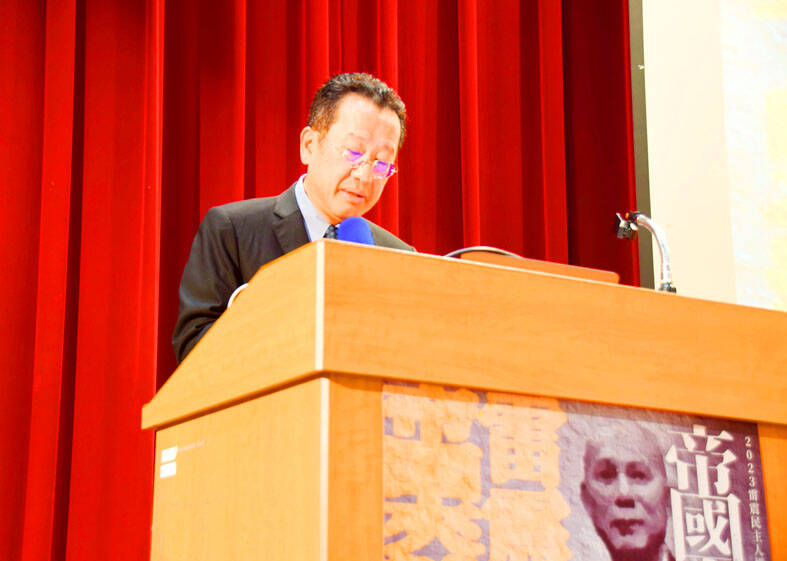The Chinese Communist Party’s (CCP) cognitive warfare efforts against Taiwan have increased over the past few years, and Beijing is expected to attempt to intervene in next year’s presidential and legislative elections, National Security Council Secretary-General Wellington Koo (顧立雄) said yesterday.
Koo made the remarks at an annual seminar held by the Lei Chen Foundation for Democracy and Human Rights.
Democracy is facing challenges worldwide, Koo said, citing a report published on March 2 by the University of Gothenburg’s Department of Political Science.

Photo: CNA
The report by the Swedish university highlighted that 72 percent of the global population, or about 5.7 billion people, live under authoritarian rule, Koo said.
“The level of democracy enjoyed by the average world citizen in 2022 is back to 1986 levels,” Koo cited the report as saying.
In terms of democratic freedoms, Taiwan ranks 30th globally and third in Asia, but as the nation is in the first island chain and at the center of a geopolitical confrontation between the US and China, its democratic way of life is greatly challenged, Koo said.
Escalating tensions in and near the Taiwan Strait should be a warning for the world, he said, adding that China not only attempts to compete with the US, but also seeks to challenge the world order.
Koo said Washington’s plan to establish military bases in the Philippines is a response to the Chinese threat, as the US seeks to deter Beijing from spreading its autocratic system in the Indo-Pacific region.
Countries that have long hoped that China would maintain a “peaceful rise” have increasingly become aware of the threat and issued clear warnings regarding Chinese aggressions against Taiwan, Koo said.
Taipei’s primary goal is to maintain peace and stability in the Taiwan Strait, safeguard Taiwan’s hard-won democratic way of life and ensure that Taiwanese determine their own future, Koo said.
Taiwan is looking to deepen international collaborations and form closer ties with its democratic allies, Koo said.
Even though democracy is inherently fragile against manipulation by autocratic states, as long as Taiwanese remain united, democracy would be the aegis of our country, Koo said.

DAREDEVIL: Honnold said it had always been a dream of his to climb Taipei 101, while a Netflix producer said the skyscraper was ‘a real icon of this country’ US climber Alex Honnold yesterday took on Taiwan’s tallest building, becoming the first person to scale Taipei 101 without a rope, harness or safety net. Hundreds of spectators gathered at the base of the 101-story skyscraper to watch Honnold, 40, embark on his daredevil feat, which was also broadcast live on Netflix. Dressed in a red T-shirt and yellow custom-made climbing shoes, Honnold swiftly moved up the southeast face of the glass and steel building. At one point, he stepped onto a platform midway up to wave down at fans and onlookers who were taking photos. People watching from inside

A Vietnamese migrant worker yesterday won NT$12 million (US$379,627) on a Lunar New Year scratch card in Kaohsiung as part of Taiwan Lottery Co’s (台灣彩券) “NT$12 Million Grand Fortune” (1200萬大吉利) game. The man was the first top-prize winner of the new game launched on Jan. 6 to mark the Lunar New Year. Three Vietnamese migrant workers visited a Taiwan Lottery shop on Xinyue Street in Kaohsiung’s Gangshan District (崗山), a store representative said. The player bought multiple tickets and, after winning nothing, held the final lottery ticket in one hand and rubbed the store’s statue of the Maitreya Buddha’s belly with the other,

‘NATO-PLUS’: ‘Our strategic partners in the Indo-Pacific are facing increasing aggression by the Chinese Communist Party,’ US Representative Rob Wittman said The US House of Representatives on Monday released its version of the Consolidated Appropriations Act, which includes US$1.15 billion to support security cooperation with Taiwan. The omnibus act, covering US$1.2 trillion of spending, allocates US$1 billion for the Taiwan Security Cooperation Initiative, as well as US$150 million for the replacement of defense articles and reimbursement of defense services provided to Taiwan. The fund allocations were based on the US National Defense Authorization Act for fiscal 2026 that was passed by the US Congress last month and authorized up to US$1 billion to the US Defense Security Cooperation Agency in support of the

‘COMMITTED TO DETERRENCE’: Washington would stand by its allies, but it can only help as much as countries help themselves, Raymond Greene said The US is committed to deterrence in the first island chain, but it should not bear the burden alone, as “freedom is not free,” American Institute in Taiwan Director Raymond Greene said in a speech at the Institute for National Defense and Security Research’s “Strengthening Resilience: Defense as the Engine of Development” seminar in Taipei yesterday. In the speech, titled “Investing Together and a Secure and Prosperous Future,” Greene highlighted the contributions of US President Donald Trump’s administration to Taiwan’s defense efforts, including the establishment of supply chains for drones and autonomous systems, offers of security assistance and the expansion of